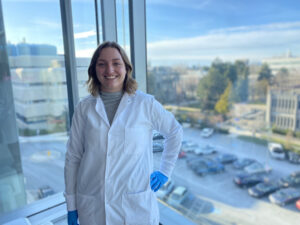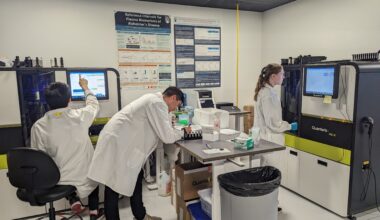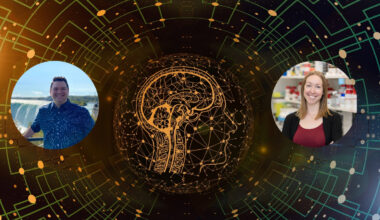Dr. Megan Rowland is a postdoctoral fellow in Dr. Annie Ciernia’s lab. We caught up with Megan to learn more about her latest research and her hobbies outside of the lab.
What was the focus of your PhD and what made you interested in joining Dr. Ciernia’s lab?
Development in general has always interested me. I started my PhD looking at liver development, but ultimately made a switch and ended up focusing on the brain, and specifically studied a protein called ATRX which is involved in intellectual disability.
I was drawn to Dr. Ciernia’s lab because our interests overlap a lot. Her lab combines experimental and computational approaches to understand how epigenetic mechanisms regulate gene expression and how that might be related to neurodevelopmental disorders like autism spectrum disorder. When I was looking for a postdoctoral position, it was important for me to develop new skills that I didn’t learn in my PhD, one of which was bioinformatics which the Ciernia lab does a lot of. Dr. Ciernia also strives to create an inclusive and transparent environment which I wanted to be a part of.
You recently published a review paper as first author. What was this paper about?
This review was looking at the Brg1 Associated Factor (BAF) complex, which has a neuron-specific complex that our lab is interested in. Researchers are trying to figure out the function of this complex, and the role it might play in autism spectrum disorder (ASD). Previous research using whole exome sequencing in people living with ASD found this complex had mutations, so we’re trying to better understand this.

You also recently published another paper which was a unique experience for you. Tell us a bit about that.
In collaboration with another lab at UC Davis, we looked at peripheral cell immune responses in kids living with ASD. We found gene expression changes in monocytes—a type of white blood cell—in children without ASD compared to children with the disorder, which suggests that the immune response in monocytes might not be properly turned off in children with ASD.
I did the bioinformatics for this paper, which made it my first computational project. Prior to this I didn’t have a lot of experience with coding, but Dr. Ciernia is a great teacher and I learned a lot working on this.
All of our data and codes are open source on our lab’s GitHub, which is really important to both Dr. Ciernia and myself.
What do you enjoy about being part of the Centre?
I really like how it’s all open concept and I can talk to everyone on our floor. There’s so much opportunity for collaboration and to meet new people, and I find this a very supportive environment.
What do you enjoy doing outside of the lab?
I have a dog, so all my hobbies revolve around him! I go on lots of hikes, and I like going to the beach. I do like to garden but I live in an apartment, so I’ve become a container gardener.


